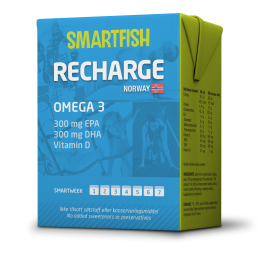The research, published in the Journal of Child Psychology and Psychiatry, gave a juice drink containing 1000 mg of omega-3 or placebo to two groups of 100 children.
It found six months of daily supplementation resulted in a 41.6% reduction in parent-rated child externalised behaviour problems when given to the 8-16-year-olds. The behaviour changes were measured six months after after treatment ended.
The study also found that giving children omega-3 resulted in improvements in anti-social behaviour in their caregivers compared to controls.
Professor David Smith, Professor Emeritus of Pharmacology at Oxford University commented: “This is a very interesting and well-performed study. What is striking is that the effect was found six months after the end of a six-month treatment period, but was not apparent immediately after the end of treatment. More than half the improvement was associated with a change in the parents’ attitudes.”
The juice, provided by Norwegian firm, Smartfish, contained 300 mg of DHA (docosahexaenoic acid), 200 mg of EPA (eicosapentaenoic acid), 400 mg of ALA (alpha-linolenic acid) and 100 mg of DPA (docosapentaenoic acid).
A similar long-term reduction (68.4%) was observed for internalised behaviours such as childhood depression.
Not just about the kids…"important social implications"
Reductions in parental psychopathy accounted for 60.9% of the improvement in child antisocial behaviour, concluded the research team, which was led by professor Adrian Raine, of the Richard Perry University Departments of Criminology, Psychiatry, and Psychology in Philadelphia.
He told Nutraingredients the study appears to reduce problem behaviour in parents as well as children, which was likely because when children are easier to deal with, their parents are less stressed.
He commented: “It is the first study to document long-term reductions in child behaviour problems with omega-3. Future research needs to assess even longer-term outcomes of this treatment, as well as what the optimum dose of omega-3 is for a child to have beneficial effects.”

“The report is most promising and urgently needs replication. If confirmed it could have important social implications.”
Meanwhile Smartfish co-founder Janne Sande Mathisen told us the company was encouraged by the results for the product that is available for sale in Scandinavia and online.
“The strong results underline the commercial potential of Smartfish formulations and technology, which is further supported by other pre-clinical and clinical data.”
Source:
Journal of Child Psychology and Psychiatry
August 2014 (Doi 10.1111/jcpp.12314)
‘Reduction in behavior problems with omega-3 supplementation in children aged 8 to 16 years: a randomized, double-blind, placebo-controlled, stratified, parallel-group trial’
Authors: Adrian Raine, Jill Portnoy, Jianghong Liu, Tashneem Mahoomed, and Joseph R. Hibbeln
